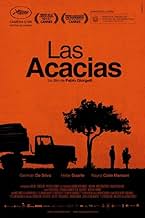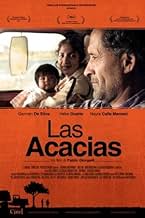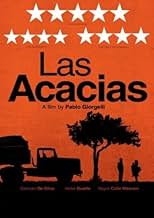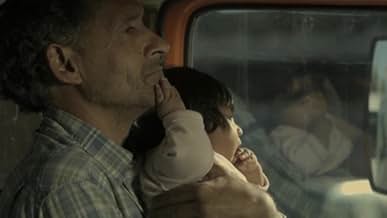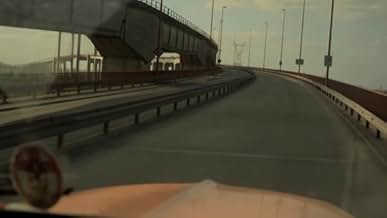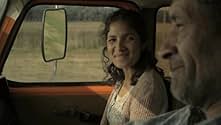IMDb RATING
6.9/10
2.5K
YOUR RATING
Reluctantly, a dour long-distance truck driver agrees to give a lift to a Paraguayan single mother and her five-month-old daughter to Buenos Aires. Can the palpable silence soften up the tac... Read allReluctantly, a dour long-distance truck driver agrees to give a lift to a Paraguayan single mother and her five-month-old daughter to Buenos Aires. Can the palpable silence soften up the taciturn trucker's sullen heart?Reluctantly, a dour long-distance truck driver agrees to give a lift to a Paraguayan single mother and her five-month-old daughter to Buenos Aires. Can the palpable silence soften up the taciturn trucker's sullen heart?
- Director
- Writers
- Stars
- Awards
- 19 wins & 22 nominations total
Germán De Silva
- Rubén
- (as Germán de Silva)
Matilde Jazmín Mamani
- Prima Anahí
- (as Matilde Jazmín Quispe Mamani)
Odón Morán López
- Camionero Paraguayo
- (as Odón Morán Lopez)
Darío Luchetta
- Camionero en asado
- (as Darío Lucchetta)
Yanina López
- Hija dueña parrilla
- (as Yanina Paz López)
- Director
- Writers
- All cast & crew
- Production, box office & more at IMDbPro
Featured reviews
You don't know what they're thinking, you don't know how they're feeling, you can only guess. That's what makes this film intriguing and gives a "real life" feel to it. There is no background intrusive music, just the hum of a timber lorry lumbering (!) on the highway to Buenos Aires with its human cargo of man, woman and baby. One of the adults seems to have a lonely life without a family, the other one is part of a large and loving family, but there are hints of problems in their backgrounds. By journey's end you are hoping that all three will share a happy future together. By the way, there's no violence and only one brief bit of swearing.
A middle-aged truck driver's long years of hauling lumber from Asuncion, Paraguay to Buenos Aires is etched on his grizzled face. Looking as if he hasn't shaved in weeks, maybe months, his body language displays a passive solitude, as if he has become reconciled to a world of emptiness. Winner of the Camera d'Or for the best first feature in Cannes, Pablo Giorgelli's Las Acacias is a work of deceptive simplicity, a film that captures the essence of human longing mostly through facial expressions, glances, and gestures. Though it is mainly shot inside the cab of a truck and has very little dialogue, it never feels claustrophobic or dull, its natural performances allowing us to feel as if we are observing events in real time.
The driver, Rubén (German de Silva), is transporting a load of acacia wood to Buenos Aires and has agreed to bring Jacinta (Hebe Duarte), a young Paraguayan woman with him at the request of his boss. When he finds out that the woman, heavily loaded down with suitcases, is also bringing her five-month old daughter, Anahi (Nayra Calle Mamani), he says nothing, but the annoyed look on his face tells the story. Nothing is said for the first thirty minutes as they begin their 1500 kilometer journey, but the silence is not oppressive. Rather, there is simply quiet as the languid motion of the truck sways to the rhythm of the road. Giorgelli said that "I wanted you to feel the fatigue of this long journey," and we do. It is long but never tiring, however.
As the camera reflects on the passing scenery and the images the driver sees through his rear-view mirror, we observe the eyes of the driver, his passenger, and the baby whose look is the most expressive of all. We know nothing of his background or that of the woman's. Ruben's frozen inability to express emotion begins to melt, however, as Jacinta's warmth and the baby's sweet smile awakens in him a sense of his lost humanity. During the course of the trip they begin to open up, slowly revealing their troubled past. He tells Jacinta that he has a son that he hasn't seen in eight years, and she tells him that Anahi has no father.
Jacinta talks to her daughter in the ancient Guarani language and Ruben asks her to translate. When Anahi begins to cry, Rubén quiets her by giving her a cup to play with, and a barely articulated affection emerges. Written by Salvador Roselli, Las Acacias is a film of emotional richness that has no extraneous conversation, enigmatic symbolism, or background music. It is a film where nothing happens and everything happens, that understands that silence alone, in the words of British author Karen Armstrong, "is appropriate for what lies beyond words." A work of deep and abiding humanity, Las Acacias is one of the best films of the year.
The driver, Rubén (German de Silva), is transporting a load of acacia wood to Buenos Aires and has agreed to bring Jacinta (Hebe Duarte), a young Paraguayan woman with him at the request of his boss. When he finds out that the woman, heavily loaded down with suitcases, is also bringing her five-month old daughter, Anahi (Nayra Calle Mamani), he says nothing, but the annoyed look on his face tells the story. Nothing is said for the first thirty minutes as they begin their 1500 kilometer journey, but the silence is not oppressive. Rather, there is simply quiet as the languid motion of the truck sways to the rhythm of the road. Giorgelli said that "I wanted you to feel the fatigue of this long journey," and we do. It is long but never tiring, however.
As the camera reflects on the passing scenery and the images the driver sees through his rear-view mirror, we observe the eyes of the driver, his passenger, and the baby whose look is the most expressive of all. We know nothing of his background or that of the woman's. Ruben's frozen inability to express emotion begins to melt, however, as Jacinta's warmth and the baby's sweet smile awakens in him a sense of his lost humanity. During the course of the trip they begin to open up, slowly revealing their troubled past. He tells Jacinta that he has a son that he hasn't seen in eight years, and she tells him that Anahi has no father.
Jacinta talks to her daughter in the ancient Guarani language and Ruben asks her to translate. When Anahi begins to cry, Rubén quiets her by giving her a cup to play with, and a barely articulated affection emerges. Written by Salvador Roselli, Las Acacias is a film of emotional richness that has no extraneous conversation, enigmatic symbolism, or background music. It is a film where nothing happens and everything happens, that understands that silence alone, in the words of British author Karen Armstrong, "is appropriate for what lies beyond words." A work of deep and abiding humanity, Las Acacias is one of the best films of the year.
Since its inception in the 1960s, the road movie genre has always represented adventure, debauchery and freedom. One is put in mind of Bonnie and Clyde charging along an open road leaving bodies and bank vaults in their wake, or Wyatt and Billy in Dennis Hopper's Easy Rider blowing joint smoke in the face of conformity.
Argentinean director Pablo Giorgelli's debut feature Las Acacias embodies none of these conventions, but it is a road movie in the most essential sense of the phrase. It is a story about driving from point A to point B: middle-aged truck driver Rubén (Germán de Silva) has been asked by his boss to transport single mother Jacinta (Hebe Duarte) and her five-month-old daughter Anahí (Nayra Calle Mamani) to her cousin's house in Buenos Aires, where she hopes to find work. Other than the occasional stop to refuel and have dinner, it is a full 85 minutes of Rubén just getting on with the job.
In the film's opening half hour we are constantly taunted with the possibility of conventional drama, yet it is dismissed at every turn. Going on Rubén's gruff demeanour, one assumes this may be a slightly dodgy arrangement, in which Jacinta has paid Rubén's boss to help her get out of the country. However, it turns out to be pretty much above board. When they are stopped at the border, one expects them to spout a web of lies to keep the shady truth from the inspectors, but in fact they merely explain themselves sincerely and are let through without any hassle. Similarly, the mystery surrounding Jacinta and Anahí, who she insists 'has no father', is never really explored. At one point, Ruben sees Jacinta crying, but instead of asking her what's wrong and give her the chance to tell her story, he walks away.
After a while you're forced to confront the fact that the film isn't going to diverge at all from the straightforward route it set out to take. At the Sunday morning 'OAPs get in free' screening that I attended, a good few of the older patrons eventually gave up and walked out, unable to bear the boredom anymore and free from the desire to get their money's worth. Yet as gruellingly tedious as Las Acacias can be, if you persist you're gifted with a touching and surprisingly unique film experience.
Unlike the road movie heroes of old, who took to the highway in search of adventure, driving is Ruben's profession and it isolates him from the rest of the world. Constantly hauling lumber from one place to the next, he is deprived of any human contact, and at the beginning he sees Jacinta and Anahí as a mere inconvenience. But in spite of Rubén's detachment and Jacinta's 'I've been hurt before' timidity, the two begin to bond. While the premise is admittedly a little corny, their relationship unfolds in a completely natural way, emanating out of brief conversations and fleeting glances. Of course, this is all far from exciting, but Giorgelli's pared-down style brings a reality and poignancy to the narrative, which is in itself rather captivating.
The most diligent viewer should be forgiven for phasing out from time to time, but boredom seems to be an essential reaction which the film seeks to invoke. Forced to spend an hour-and-a-half imprisoned in Rubén's truck, we become like another passenger, and while your eyes may occasionally wander or you may even nod off, you nevertheless find yourself engrossed in their journey. The film builds softly to a bittersweet ending and having been so closely subjected to this would-be courtship yourself, it is all the more heartrending.
Las Acacias is a road movie about as exciting as a long commute. Nothing really happens and even less is said. But within its static, self- contained world, something pretty remarkable takes place.
Argentinean director Pablo Giorgelli's debut feature Las Acacias embodies none of these conventions, but it is a road movie in the most essential sense of the phrase. It is a story about driving from point A to point B: middle-aged truck driver Rubén (Germán de Silva) has been asked by his boss to transport single mother Jacinta (Hebe Duarte) and her five-month-old daughter Anahí (Nayra Calle Mamani) to her cousin's house in Buenos Aires, where she hopes to find work. Other than the occasional stop to refuel and have dinner, it is a full 85 minutes of Rubén just getting on with the job.
In the film's opening half hour we are constantly taunted with the possibility of conventional drama, yet it is dismissed at every turn. Going on Rubén's gruff demeanour, one assumes this may be a slightly dodgy arrangement, in which Jacinta has paid Rubén's boss to help her get out of the country. However, it turns out to be pretty much above board. When they are stopped at the border, one expects them to spout a web of lies to keep the shady truth from the inspectors, but in fact they merely explain themselves sincerely and are let through without any hassle. Similarly, the mystery surrounding Jacinta and Anahí, who she insists 'has no father', is never really explored. At one point, Ruben sees Jacinta crying, but instead of asking her what's wrong and give her the chance to tell her story, he walks away.
After a while you're forced to confront the fact that the film isn't going to diverge at all from the straightforward route it set out to take. At the Sunday morning 'OAPs get in free' screening that I attended, a good few of the older patrons eventually gave up and walked out, unable to bear the boredom anymore and free from the desire to get their money's worth. Yet as gruellingly tedious as Las Acacias can be, if you persist you're gifted with a touching and surprisingly unique film experience.
Unlike the road movie heroes of old, who took to the highway in search of adventure, driving is Ruben's profession and it isolates him from the rest of the world. Constantly hauling lumber from one place to the next, he is deprived of any human contact, and at the beginning he sees Jacinta and Anahí as a mere inconvenience. But in spite of Rubén's detachment and Jacinta's 'I've been hurt before' timidity, the two begin to bond. While the premise is admittedly a little corny, their relationship unfolds in a completely natural way, emanating out of brief conversations and fleeting glances. Of course, this is all far from exciting, but Giorgelli's pared-down style brings a reality and poignancy to the narrative, which is in itself rather captivating.
The most diligent viewer should be forgiven for phasing out from time to time, but boredom seems to be an essential reaction which the film seeks to invoke. Forced to spend an hour-and-a-half imprisoned in Rubén's truck, we become like another passenger, and while your eyes may occasionally wander or you may even nod off, you nevertheless find yourself engrossed in their journey. The film builds softly to a bittersweet ending and having been so closely subjected to this would-be courtship yourself, it is all the more heartrending.
Las Acacias is a road movie about as exciting as a long commute. Nothing really happens and even less is said. But within its static, self- contained world, something pretty remarkable takes place.
Las Acacias begins with the sound of a chainsaw followed by a lumberjack felling a fairly large tree. Many others fall and they are then loaded on to a tractor trailer. A man drives alone, lost in his thoughts, as he carries the cargo through the rural countryside. He stops at a truck stop to wash up and we can see a scar, curving from his back shoulder to his ribs. He steps outside to smoke a cigarette and a young woman approaches with a baby and asks if he is Ruben. He replies yes and that he was not told about the child. She explains that it is a misunderstanding and they get into the rig and Ruben seems less than thrilled with his passengers.
First stop, "welcome to Paraguay" on a sign and he tells her to get out and walk across the border and he will pick them up on the other side. He fills out the necessary paper work and then eats dinner alone. She gets back in and at the next stop the officers ask to see her papers and ask if she has the fathers permission to travel with her offspring. She answers that there is no father. Ruben takes the pair to a diner so that madre can feed little nina.
Back on the road, he finally asks her name, which turns out to be Jacinta and her child is Anani. She asks if he has a family, and at first he says no but then admits to having a son. On route he pays a short visit to his sister and afterwords finds a peaceful lake to sit beside with his passengers where they discuss mundane things like dogs, which they both like, and Anani's age which is five months. There is very little conversation, with most communication being non verbal. Both actors are very good at showing their feelings with facial expressions. As the drive progresses, Ruben grows more and more attached to Jacinta and Anani and as it nears the conclusion I actually cared what happened to them, which is a rare thing in most movies. I do not agree with the negative reviews posted, complaining about the lack of dialogue. Be patient and let the subtlety overtake you, as it did me.
First stop, "welcome to Paraguay" on a sign and he tells her to get out and walk across the border and he will pick them up on the other side. He fills out the necessary paper work and then eats dinner alone. She gets back in and at the next stop the officers ask to see her papers and ask if she has the fathers permission to travel with her offspring. She answers that there is no father. Ruben takes the pair to a diner so that madre can feed little nina.
Back on the road, he finally asks her name, which turns out to be Jacinta and her child is Anani. She asks if he has a family, and at first he says no but then admits to having a son. On route he pays a short visit to his sister and afterwords finds a peaceful lake to sit beside with his passengers where they discuss mundane things like dogs, which they both like, and Anani's age which is five months. There is very little conversation, with most communication being non verbal. Both actors are very good at showing their feelings with facial expressions. As the drive progresses, Ruben grows more and more attached to Jacinta and Anani and as it nears the conclusion I actually cared what happened to them, which is a rare thing in most movies. I do not agree with the negative reviews posted, complaining about the lack of dialogue. Be patient and let the subtlety overtake you, as it did me.
In Paolo Giorgelli's quiet film 'Las Acacias', not a lot happens. A truck driver with a load of wood (hence the title) gives a lift, somewhat reluctantly, to a woman with a child. They don't talk a lot, but they're both lonely; by the end of the movie, they decide they'd like to see each other again. And that's it. The film covers a journey of 800 miles through South America, but there are no stunning landscapes on view: just a lot of scenes of two people sitting quietly in a cab. And yet, almost strangely, it doesn't drag: there's a feeling of truthfulness that compensates for the absence of action. In spite of being almost unremarkable by design, it's understated quality tells in the end.
Did you know
- TriviaFilmed in five weeks between Paraguay and Buenos Aires.
- ConnectionsFeatured in The Smallest Red Carpet, But the Biggest Heart (2011)
Details
- Release date
- Countries of origin
- Official sites
- Languages
- Also known as
- Akasyalar
- Filming locations
- Production companies
- See more company credits at IMDbPro
Box office
- Gross US & Canada
- $6,000
- Opening weekend US & Canada
- $6,000
- Sep 9, 2012
- Gross worldwide
- $355,979
- Runtime
- 1h 22m(82 min)
- Sound mix
- Aspect ratio
- 1.85 : 1
Contribute to this page
Suggest an edit or add missing content

